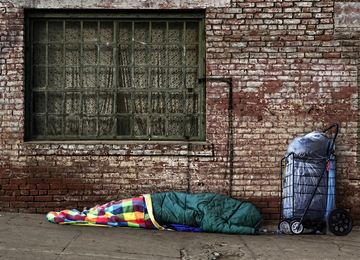
Blog
The War on
Poverty: 50
Years Later
By: Esther Larson
Don’t worry – I’m not going down the partisan route of talking about poverty through a political angle. I’ll let Senator Cory Booker and Representative Paul Ryan’s words speak for themselves. Rather, I”ll be considering the 50th Anniversary of the “War on Poverty” and how the Gospel transforms our thinking of poverty.
First: Whether you believe the War on Poverty has been successful or not, the reality is that over 47 million Americans are currently living in poverty. 47 million Americans are still struggling with making ends meet – not knowing where their next meal might come from, not knowing how they’re going to afford the commute to their second job at night, not knowing where the rent is going to come from at the end of the month. This number alone suggests, rather, demands that we as a country made of individual states, find out what policies are not working, fix them, perhaps abandon them, and re-focus efforts on proven, evidence-based programs that are helping break the cycle of poverty. Representative Ryan: “But despite trillions of dollars in spending, 47 million Americans still live in poverty today.” And as Cory Booker says in his piece: “But doing more doesn’t mean wasteful and indiscriminate spending. Doing more means making smart investments in proven programs and innovating around promising new strategies.” Though the bi-partisan nature of this debate is clear, it is encouraging to see that both of the aisles can admit we have a problem and need to find new, innovative solutions to approach it.
Second: Based on the Gospel, it is undeniable that Jesus loves these 47 million Americans – Jesus loves the poor, cares for the poor, and calls his followers to love the poor as well. What breaks Jesus’ heart, must break ours as well. Take the example of the Old and New Testaments (quoted from NIV): “Deuteronomy 10:18-19 “He defends the cause of the fatherless and the widow, and loves the foreigner residing among you, giving them food and clothing. And you are to love those who are foreigners, for you yourselves were foreigners in Egypt.” And in James 2:15-17 “15 Suppose a brother or a sister is without clothes and daily food. 16 If one of you says to them, “Go in peace; keep warm and well fed,” but does nothing about their physical needs, what good is it? 17 In the same way, faith by itself, if it is not accompanied by action, is dead.” Jesus refers to the poor, the helpless, the hopeless so many times throughout Scripture – He befriends them, loves them, cares for them, challenges them to start living a transformed life.
Third: If we agree that poverty is (1) indeed a problem in our country and (2) that we as Christians should respond to it, the next question to consider is “what is a Gospel-centered response to poverty”? Clearly, this is a subject that needs a book, or several books to properly address but a few thoughts to consider.
First and foremost, the Gospel-centered response to poverty is following Jesus’s example of living a life full of compassion and mercy. This means consistently living for others, in response to the grace and love Christ extends to us. For some, this means actively volunteering and interacting with the poor. For others, it might mean supporting organizations who are serving the poor by helping them in practical ways by serving on the Board, financially supporting the organization, or by creatively using your skills for their work. For some, it might be to commit to consistently praying for the brokenness of the City, that God would call Christians to enter into the brokenness in practical ways. The important thing, is that we as Christians are doing something – that we’re not becoming callous in our attitude for the poor and we’re not sitting in pride as we think of those in need.
As we celebrate the 50th Anniversary of the War on Poverty, may we learn from the past, work and serve in the present, and pray for our leaders and for our world, that God would bring about renewal and healing to all those in physical, spiritual, and emotional need. Jesus showed us what living a life for others looks like – may each of us prayerfully consider what our individual call to serve and love others is.
For more resources on how to serve the City and the poor, go to http://www.hfny.org/; for sermons related to mercy and justice and service, go HERE.
